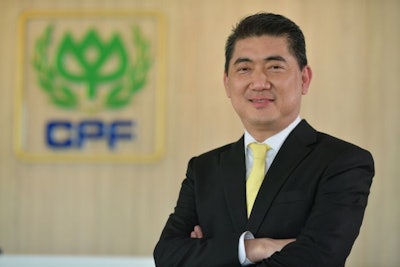
Charoen Pokphand Foods PLC (CP Foods) has made environmental goals ranging from reducing carbon emissions to cleaning the ocean.
The Thailand-based company’s 2030 Sustainability in Action plan intends to reduce greenhouse gas (GHG) emissions per unit of output by 25% by 2025.
“Energy consumption and waste management leave impacts on climate change. CP Foods thus launches an energy efficiency project to deal with our energy consumption, the management of animal dung and wastewater and the promotion of renewable energy like biodiesel, biogas and solar power,” said CP Foods CEO Prasit Boondoungprasert in a press release April 25. “This will further reduce greenhouse gas emissions in support of the United Nations Sustainable Development Goals.”
Clean energy
The company’s main initiative is the transition to clean energy—primarily biomass, biogas and solar power—which accounts for 27% of the company’s energy use. This clean energy reduces GHG emissions by 575,000 tons of carbon dioxide per year which is equivalent to the carbon absorption capacity of 60 million trees.
Solar panels also provide 20 megawatts of electricity to 37 CP Foods plants and farms which reduces GHG emissions by 13,000 tons of carbon dioxide.
Biogas is a biofuel produced from the decomposition of organic waste. Over 100 CP Foods farms produce 69 million kilowatts of electricity from biogas which cuts GHG emissions by 492,000 tons of carbon dioxide. The company is transitioning three more plants to biogas which will reduce an additional 70,000 tons of carbon dioxide in 2022.
CP Foods also promised to stop using coal for its operations in Thailand and will transition to biomass which will reduce GHG emissions by 70,000 tons of carbon dioxide.
The company will also be investing in robotics, automations and artificial intelligence to help reduce energy consumption.
Conservation
CP Foods intends to grow green areas by over 12 square miles through its upstream forest conservation and rehabilitation projects: CPF Rak-Nives Project which will focus on the Pasak River Basin, Phraya Doen Thong Mountain and Lopburi province and the CPF Grow-Share-Protect Mangrove Forestation Project. It is projected this reforestation project will result in a carbon absorption capacity of 200,000 tons of carbon dioxide.
The company promised its global sourcing will cause zero forest encroachment by 2030 and announced the goal to achieve zero food waste by 2030.
CP Foods’ ocean trash project encourages fisherman to not dump their waste in the ocean and to return it to shore. In 2021 the company JDP Co., Ltd. asked its fishermen to collect plastic bottles from the ocean. These bottles are recycled and used to make shirts for CP Foods employees.

















